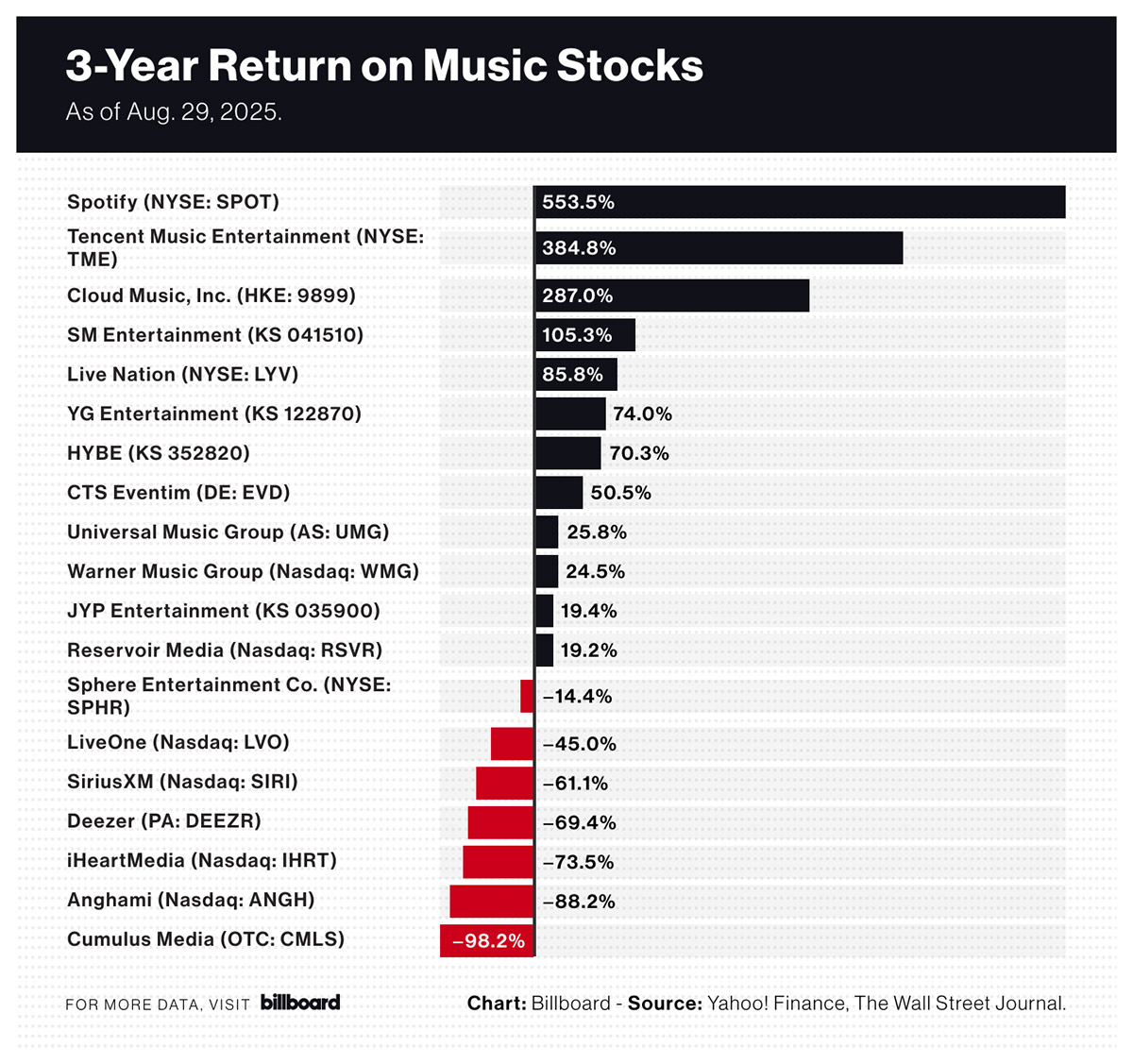Which Music Companies Had the Best Stock Returns in the Last Three Years?
The post-COVID boom in demand for music has been a financial boon for the industry. Some, however, have benefited more than others.
Stock returns over the last three years (the period ended Aug. 29) show that a trio of music streaming companies, some K-pop agencies and a few live music companies have taken a majority of the spoils. Spotify, Tencent Music Entertainment (TME) and NetEase Cloud Music have given investors an average return on investment of 408% over that period. Meanwhile, South Korea’s SM Entertainment’s 105.3% gain — coming entirely in the last 12 months — makes it the only other company to exceed a 100% return. In addition, as fans clamored for live music and sidelined artists resumed touring, concert promoters Live Nation and CTS Eventim gained 85.8% and 50.5%, respectively.
Three years ago, Spotify was in a rut. Its stock price, which had exploded in 2020 and 2021 from pandemic-era subscriber growth and enthusiasm about its growing podcast business, had lost about two-thirds of its value in the previous 12 months. Investors who piled into white-hot streaming stocks during COVID-19 lockdowns wanted profitability, not just growth. Music streaming, which had been criticized for decades as financially untenable, would have to do better.
Spotify reacted accordingly. It laid off approximately a quarter of its workforce from 2023 to 2024 and started to treat its prices, which had remained essentially unchanged since the company’s launch in the late ‘00s, as a strategic tool rather than a sacred cow. The combination of lower expenses and higher prices quickly boosted the company’s financials. From 2023 to 2024, gross profit margin jumped from 25.6% to 30.1% and the company’s 446 million euro ($483 million) operating loss turned into a 1.37 billion euro ($1.48 billion) operating profit.
Today, the Stockholm-based company has proven that the long-maligned music streaming business model can work. An investor who put $1,000 in Spotify stock on Sept. 2, 2022, would have had approximately $6,350 three years later — an eye-watering 553.5% return that makes Spotify the top-performing music stock over the last three years. The company’s market capitalization has grown by $118 billion to nearly $140 billion — an increase worth more than the No. 2, No. 3 and No. 4 music companies’ combined market capitalizations.
Two Chinese streaming companies have also had notable gains: TME is up 384.8% and NetEase Cloud Music has increased 287.0%. Like Spotify, both companies were also in a funk in 2022. After hitting an all-time high of $28.84 in January 2021, TME fell to a low of $3.14 in October 2022. Cloud Music had a lighter fall, dipping from 205.80 HKD ($26.48) after its December 2021 IPO to 59.20 HKD ($7.56) by April 2022.
The Chinese companies faced unique problems before recovering mightily. In 2020, the Chinese government, seeking to improve competition and regain control over fast-growing markets, started cracking down on tech companies with the cancellation of Ant Group’s IPO and an investigation into e-commerce giant Alibaba. In 2021, TME was forced to give up exclusive licensing agreements with record labels, and in 2023, TME and Cloud Music were compelled to eliminate live streaming features that could be used for gambling. Investors didn’t stay away forever, though. The Chinese government’s interventions have subsided, and both TME and Cloud Music have posted strong revenue and subscriber growth in recent years.
While all multi-sector companies — those that combine recorded music, publishing and other artist-centered businesses — have made gains in the last three years, South Korea’s K-pop companies have fared exceptionally well. In addition to SM Entertainment’s 108% three-year gain, YG Entertainment gained 74% and HYBE gained 70%. JYP Entertainment managed a 19% improvement.
K-pop companies handily beat the two standalone major music companies. Universal Music Group and Warner Music Group gained 25.8% and 24.5%, respectively. Reservoir Media, the smallest of the multi-sector companies, gained 19.2%.
The other public music companies’ stocks had losses over the last three years. The separation between gains and losses says a lot about which types of companies are reaping the rewards in today’s digital and concert-driven music business. The larger music streamers fared better than the smaller ones. Radio companies fared worse than the streamers. The more established live events companies outperformed the upstarts.
Sphere Entertainment Co. is down 14.4%, although it recovered well after a sharp drop in 2022. (MSG Entertainment doesn’t have a three-year return because it was spun off from Sphere Entertainment in 2023; MSGE shares have gained 31.2% over the last two years.) While Sphere Entertainment has fared poorly for a live music company, its dependence on the upstart Sphere venue in Las Vegas makes it a more speculative, long-term play than MSGE, Live Nation and CTS Eventim.
The smaller music streaming companies fared far worse than the three large streamers that took the top three in the rankings. LiveOne lost 45.0%, Deezer fell 69.4% and Anghami plummeted 88.2%.
The Nasdaq composite, an index of the tech-heavy stock exchange, rose 81.8% over the three-year period. The S&P 500, an index of the 500 leading public companies traded in the U.S., rose 64.6%.
Foreign indexes had smaller gains: the U.K.’s FTSE 100 grew 26.2%. South Korea’s KOSPI composite index rose 32.2%. China’s Shanghai Composite Index rose 21.1%.

Billboard









